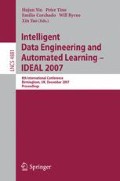Abstract
The Naive Bayes Classifier is based on the (unrealistic) assumption of independence among the values of the attributes given the class value. Consequently, its effectiveness may decrease in the presence of interdependent attributes. In spite of this, in recent years, Naive Bayes classifier is worked for a privilege position due to several reasons [1]. We present DGW (Dependency Guided Wrapper), a wrapper that uses information about dependences to transform the data representation to improve the Naive Bayes classification. This paper presents experiments comparing the performance and execution time of 12 DGW variations against 12 previous approaches, as constructive induction of cartesian product attributes, and wrappers that perform a search for optimal subsets of attributes.
Experimental results show that DGW generates a new data representation that allows the Naive Bayes to obtain better accuracy more times than any other wrapper tested. DGW variations also obtain the best possible accuracy more often than the state of the art wrappers while often spending less time in the attribute subset search process.
Access this chapter
Tax calculation will be finalised at checkout
Purchases are for personal use only
Preview
Unable to display preview. Download preview PDF.
References
Rish, I.: An empirical study of the naive bayes classifier. In: International Joint Conference on Artificial Intelligence, American Association for Artificial Intelligence, pp. 41–46 (2001)
Fisher, R.: The use of multiple measurements in taxonomic problems. Annals of Eugenics 7, 179–188 (1936)
Bayes, T.: An essay towards solving a problem in the doctrine of chances. Philosophical Transactions 53, 370–418 (1963)
Kononenko, I.: Semi-naive bayesian classifier. In: EWSL 1991. Proceedings of the European working session on learning on Machine learning, pp. 206–219. Springer, New York (1991)
Zhang, H., Ling, C.X., Zhao, Z.: The learnability of naive bayes. In: Hamilton, H.J. (ed.) AI 2000. LNCS (LNAI), vol. 1822, pp. 432–441. Springer, Heidelberg (2000)
Kononenko, I.: Inductive and bayesian learning in medical diagnosis. Applied Artificial Intelligence 7(4), 317–337 (1993)
Lewis, D.D.: Representation and learning in information retrieval. PhD thesis, Amherst, MA, USA (1992)
Lewis, D.D.: Naive (Bayes) at forty: The independence assumption in information retrieval. In: Nédellec, C., Rouveirol, C. (eds.) ECML 1998. LNCS, vol. 1398, pp. 4–15. Springer, Heidelberg (1998)
Mitchell, T.: Machine Learning, 1st edn. McGraw Hill, New York (1997)
Michie, D., Spiegelhalter, D.J., Taylor, C.C.: Machine Learning, Neural and Statistical Classification. Ellis Horwood (1994)
Kononenko, I.: Comparison od inductive and naive bayesian learning approaches to automatic knowledge adquisition
Langley, P., Iba, W., Thompson, K.: An analysis of bayesian classifiers. In: National Conference on Artificial Intelligence, pp. 223–228 (1992)
Zhang, H., Su, J.: Naive bayesian classifiers for ranking. In: Boulicaut, J.-F., Esposito, F., Giannotti, F., Pedreschi, D. (eds.) ECML 2004. LNCS (LNAI), vol. 3201, pp. 501–512. Springer, Heidelberg (2004)
Cortizo, J.C., Giráldez, J.I.: Discovering data dependencies in web content mining. In: Gutierrez, J.M., Martinez, J.J., Isaias, P. (eds.) IADIS International Conference WWW/Internet (2004)
Cortizo, J.C., Giráldez, J.I.: Multi criteria wrapper improvements to naive bayes learning. In: Corchado, E., Yin, H., Botti, V., Fyfe, C. (eds.) IDEAL 2006. LNCS, vol. 4224, pp. 419–427. Springer, Heidelberg (2006)
Friedman, N., Geiger, D., Goldszmidt, M.: Bayesian network classifiers. Machine Learning 29(2-3), 131–163 (1997)
Kohavi, R.: Scaling up the accuracy of Naive-Bayes classifiers: a decision-tree hybrid. In: Proceedings of the Second International Conference on Knowledge Discovery and Data Mining, pp. 202–207 (1996)
Pazzani, M.: Constructive induction of cartesian product attributes. ISIS: Information Statistics and Induction in Science (1996)
Domingos, P., Pazzani, M.J.: On the optimality of the simple bayesian classifier under zero-one loss. Machine Learning 29(2-3), 103–130 (1997)
Domingos, P., Pazzani, M.J.: Beyond independence: Conditions for the optimality of the simple bayesian classifier. In: International Conference on Machine Learning, pp. 105–112 (1996)
Hand, D.J., Yu, K.: Idiot’s bayes - not so stupid after all? International Statistical Review 69(3), 299–385 (2001)
Bellman, R.: Adaptive Control Processes: a Guided Tour. Princeton University Press, Princeton (1961)
Duch, W.: Filter Methods. In: Feature Extraction, Foundations and Applications, Springer, Heidelberg (2004)
Langley, P.: Selection of relevant features in machine learning. In: Proceedings of the AAI Fall Symposium on Relevance (1994)
Kohavi, R., John, G.H.: Wrappers for feature subset selection. Artificial Intelligence 97(1-2), 273–324 (1997)
Langley, P., Sage, S.: Induction of selective bayesian classifiers, pp. 399–406 (1994)
Pazzani, M.J.: Searching for Dependencies in Bayesian Classifiers. In: 5thWorkshop on Artificial Intelligence and Statistics (1996)
Kittler, J.: Feature Selection and Extraction. In: Handbook of Pattern Recognition and Image Processing, Academic Press, London (1986)
Newman, D., Hettich, S., Blake, C., Merz, C.: UCI repository of machine learning databases (1998)
Witten, I.H., Frank, E.: Data Mining: Practical Machine Learning Tools and Techniques, 2nd edn. Morgan Kaufmann, San Francisco (2005)
Hall, M.A.: Correlation-based Feature Selection for Machine Learning. PhD thesis, Department of Computer Science, University of Waikato (1998)
Author information
Authors and Affiliations
Editor information
Rights and permissions
Copyright information
© 2007 Springer-Verlag Berlin Heidelberg
About this paper
Cite this paper
Cortizo, J.C., Giraldez, I., Gaya, M.C. (2007). Wrapping the Naive Bayes Classifier to Relax the Effect of Dependences. In: Yin, H., Tino, P., Corchado, E., Byrne, W., Yao, X. (eds) Intelligent Data Engineering and Automated Learning - IDEAL 2007. IDEAL 2007. Lecture Notes in Computer Science, vol 4881. Springer, Berlin, Heidelberg. https://doi.org/10.1007/978-3-540-77226-2_24
Download citation
DOI: https://doi.org/10.1007/978-3-540-77226-2_24
Publisher Name: Springer, Berlin, Heidelberg
Print ISBN: 978-3-540-77225-5
Online ISBN: 978-3-540-77226-2
eBook Packages: Computer ScienceComputer Science (R0)

